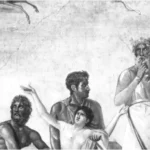
How Royal Patronage Shaped Hellenistic Literature
The incredible flowering of literature and science in the Hellenistic period would not have been possible without one crucial ingredient: royal patronage.
Exploring past events, civilizations, and historical figures that shaped our world.

The incredible flowering of literature and science in the Hellenistic period would not have been possible without one crucial ingredient: royal patronage.

While much of the high literature of the Hellenistic period was produced for an educated elite, there was also a vibrant world of popular entertainment that catered to a broader audience.

While poetry often takes the spotlight in discussions of Hellenistic literature, the period also saw the crucial development of early prose fiction.

While much Hellenistic poetry is known for its refinement and elegance, the era also saw the continuation of a much older and more aggressive genre: iambic poetry.

The Hellenistic period was not only a golden age for poetry and scholarship but also an era of unprecedented scientific advancement.

One of the most significant literary achievements of the Hellenistic period is also one of its most overlooked from a purely literary perspective: the Septuagint.

The Hellenistic period was an age of dramatic political change, and no historian captured this transformation better than Polybius of Megalopolis (c.

After the politically charged, wildly fantastical, and often obscene humor of Aristophanes' Old Comedy, Greek theater took a dramatic turn in the Hellenistic period.

In the literary landscape of the Hellenistic period, small was often considered beautiful.

Apollonius of Rhodes' *Argonautica* stands as the only epic poem to survive from the Hellenistic period, and reading it offers a unique window into the literary innovations of the era.

Imagine escaping the bustling, scholarly city of Alexandria for a simpler, idealized countryside filled with singing shepherds, lovelorn herdsmen, and the gentle sounds of nature.

No institution better represents the intellectual ambition of the Hellenistic age than the legendary Library of Alexandria.

To understand Hellenistic poetry, one must first appreciate the work of its most influential figure, Callimachus of Cyrene (c.

The Hellenistic literary world represents a fascinating era of transformation, spanning from the death of Alexander the Great in 323 BC to the rise of the Roman Empire.

The conquests of Alexander the Great did more than just create a massive empire; they initiated a new era in history known as the Hellenistic period.